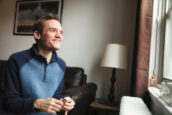
To be or not to be the Uniting Church
“Men’s Sheds are not just fixing furniture and building toys; they are fixing men and building communities.” — AMSA Mission and Values
Men’s Sheds are about being community-based, non-profit, non-commercial organisations that are accessible to all men. Their primary activity is to provide a safe, friendly and healing environment where men are able to work on meaningful projects at their own pace; in their own time; in the company of other men and to contribute to the wider community.
Men’s Sheds play an important role in the community by providing meeting places where men can find social support and camaraderie. Their major objective is to advance the well-being and health of their male members and to encourage social inclusion.
Men’s Sheds and the Uniting Church
Many Uniting Church organisations have formed close relationships with Men’s Sheds. These organisations consider ‘their’ Men’s Shed to be a part of ‘their’ Uniting Church organisation. However, Men’s Sheds are not officially recognised by the Church as Uniting Church organisations. This does not mean that a Uniting Church organisation cannot have and continue to have a relationship with their Men’s Shed. It just means that the Uniting Church is not responsible for or accountable in any way for the operation of the Men’s shed.
2012 and the events that impacted Men’s Sheds
In 2012 a number of events meant the Uniting Church was obligated to review and seriously reconsider its position in relation to a number of its activities, including Men’s Sheds.
On 1 January 2012 work, health and safety (WHS) legislation changed. The change meant that the persons responsible for ‘running’ the Men’s Shed, such as the members of Church council and/or the members of the Men’s Shed management committee, could be held personally liable if someone is injured in the workplace. The challenge is that the Uniting Church cannot, in any way, indemnify individuals against this personal liability.
Men’s Sheds and the Uniting Church moving forward
Over the past 12 months, Uniting Resources has been in discussion with some of the Congregations that currently have relationships with Men’s Sheds.
The purpose of these discussions is to help the Congregation, Church council, the Men’s Shed and their members, understand the exposures that were identified in 2012 and to work with them to mitigate their exposures.
Uniting Church insurances will only cover Men’s Shed participants in situations where there is an injury sustained on Uniting Church premises and it is proven that the injury sustained was directly caused by and attributable to negligence on the part of the Church.
Where the Uniting Church owns the actual building a Men’s Shed operates from and/or the contents of the Men’s Shed, then the Church will insure those assets only.
It is recommended that each man’s shed becomes a separately incorporated association in their own name and right, and holds the requisite insurance cover necessary to cover its operations.
If the Men’s Shed is a member of the Australian Men’s Shed Association (AMSA) then the Men’s Shed can source comprehensive insurance cover through AMSA, which is charged on a per head per member basis and provides insurance cover for all members of Men’s Sheds in the event that they are injured. AMSA can also assist the Men’s Shed through the incorporation process.
As Men’s Sheds are not Uniting Church organisations it is also imperative that formal tenancy and/or lease arrangements be entered into between the Uniting Church and the Men’s Sheds in instances where the Men’s Shed is operating on Uniting Church property.
Where to go for more information
If you have any questions or would like more information, please contact Vicki Roper 8267 4365 or vickir@nsw.uca.org.au
- Categories: Features




























































1 thought on “To be or not to be the Uniting Church”
At last! Some acknowledgement that Synod office has ejected Men’s Sheds from our parishes – a very strange way of “uniting for the common good.” When will Synod tell it’s other members how poorly they are covered by its insurance and how they could be required to produce evidence of specific authorisation for every voluntary action they perform as volunteers?